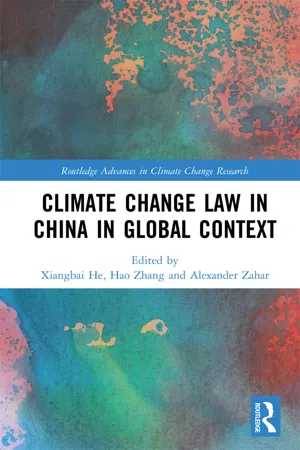
- 226 pages
- English
- ePUB (mobile friendly)
- Available on iOS & Android
Climate Change Law in China in Global Context
About This Book
In Climate Change Law in China in Global Context, seven climate change law scholars explain how the country's legal system is gradually being mobilized to support the reduction of greenhouse gas emissions in China and achieve adaptation to climate change.
There has been little English scholarship on the legal regime for climate change in China. This volume addresses this gap in the literature and focuses on recent attempts by the country to build defences against the impacts of climate change and to meet the country's international obligations on mitigation. The authors are not only interested in China's laws on paper; rather, the book explains how these laws are implemented and integrated in practice and sheds light on China's current laws, laws in preparation, the changing standing of law relative to policy, and the further reforms that will be necessary in response to the 2015 Paris Agreement on Climate Change.
This comprehensive and critical account of the Chinese legal system's response to the pressures of climate change will be an important resource for scholars of international law, environmental law, and Chinese law.
Frequently asked questions
1 China’s legal system
Sources of law and institutions related to climate change
Overview
Introduction to the Chinese legal system
Character of the Chinese legal system
Table of contents
- Cover
- Half Title
- Series
- Title
- Copyright
- Contents
- List of tables
- List of contributors
- Introduction
- 1 China’s legal system: sources of law and institutions related to climate change
- 2 Scholarship and running debates on climate law and policy in China
- 3 China in global context: continuity and discontinuity in international and domestic climate change law and policy
- 4 Renewable energy laws and policies in China in the context of climate change
- 5 China’s legal framework for emission trading and other market initiatives
- 6 Regulation of sources and sinks in China’s domestic offset scheme
- 7 Monitoring, reporting, and verification of greenhouse gas emissions in China: a legal analysis
- 8 China’s legal and policy framework for adaptation: challenges and responses
- 9 Towards a breakthrough in China’s climate change litigation: environmental public-interest litigation filed by NGOs
- Bibliography
- Index